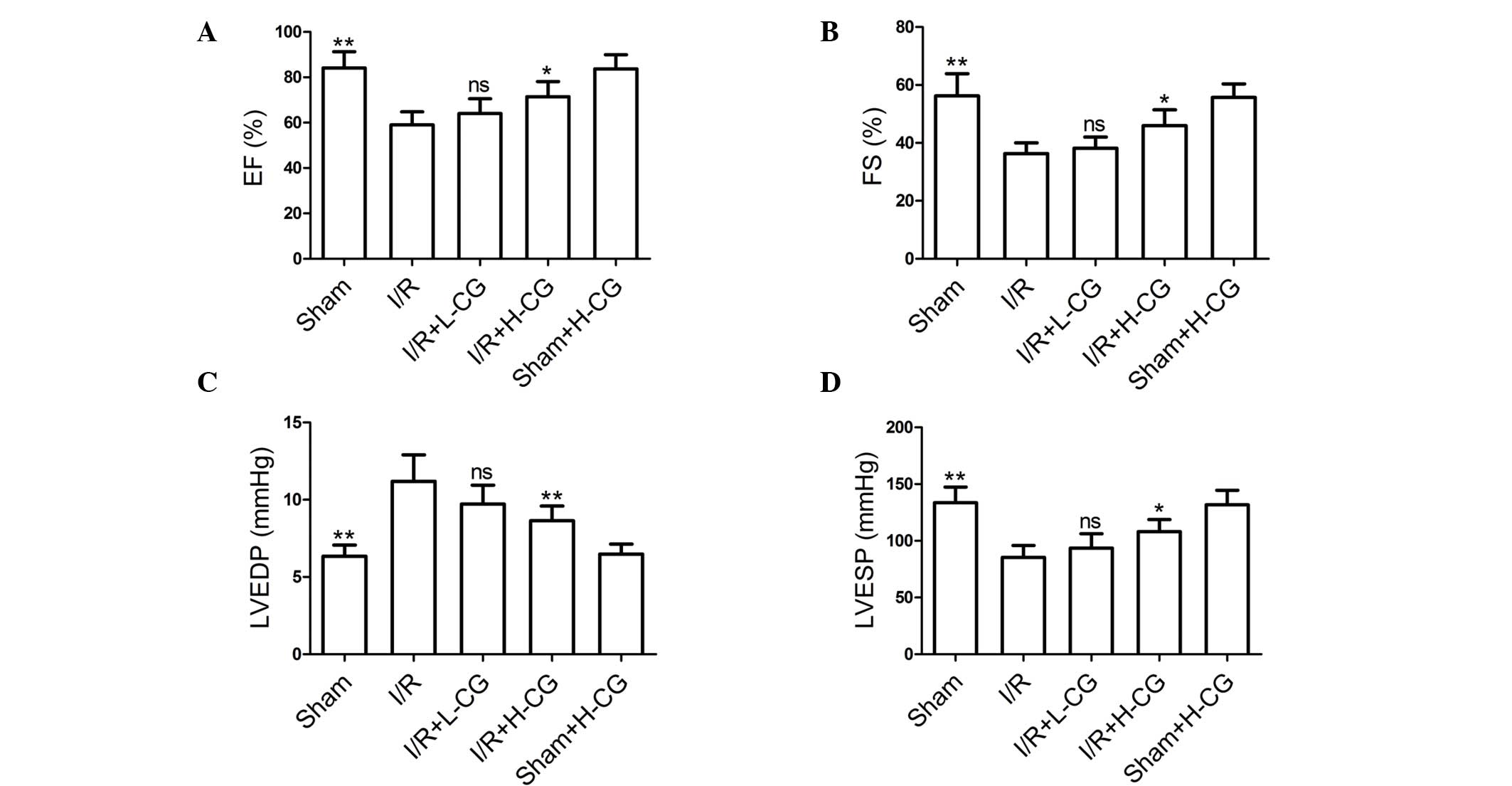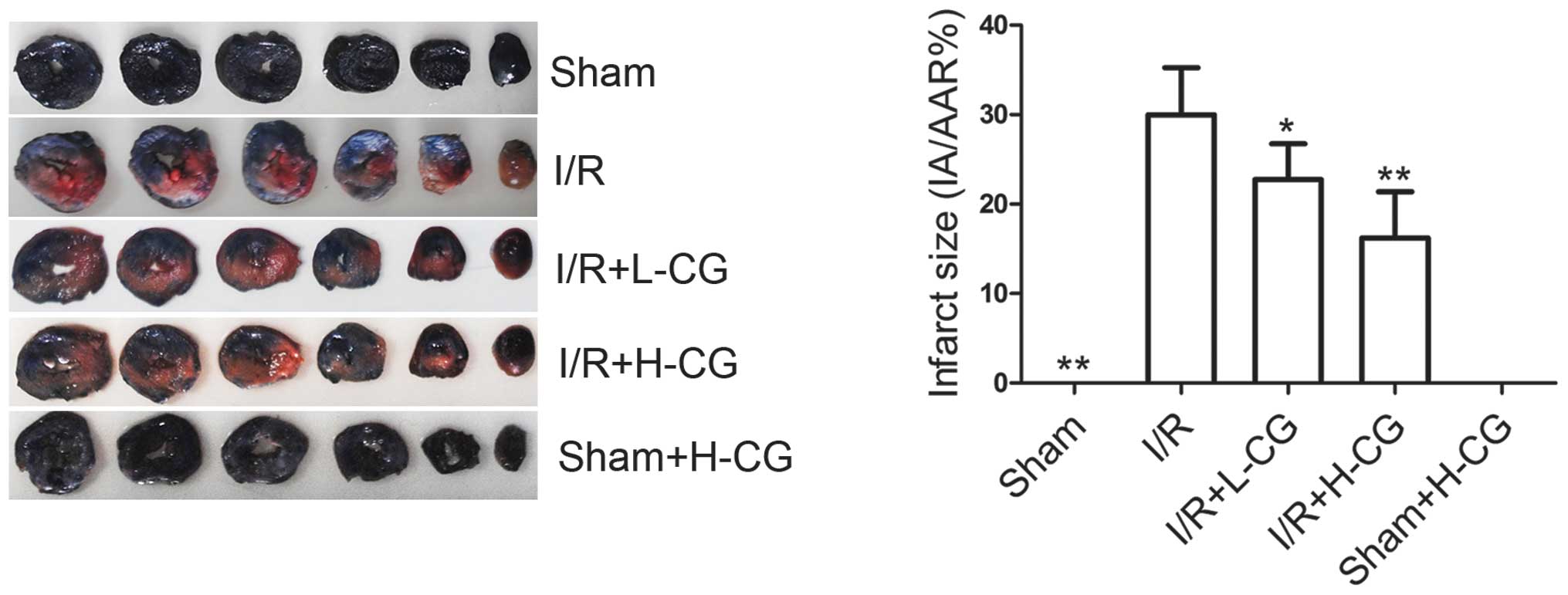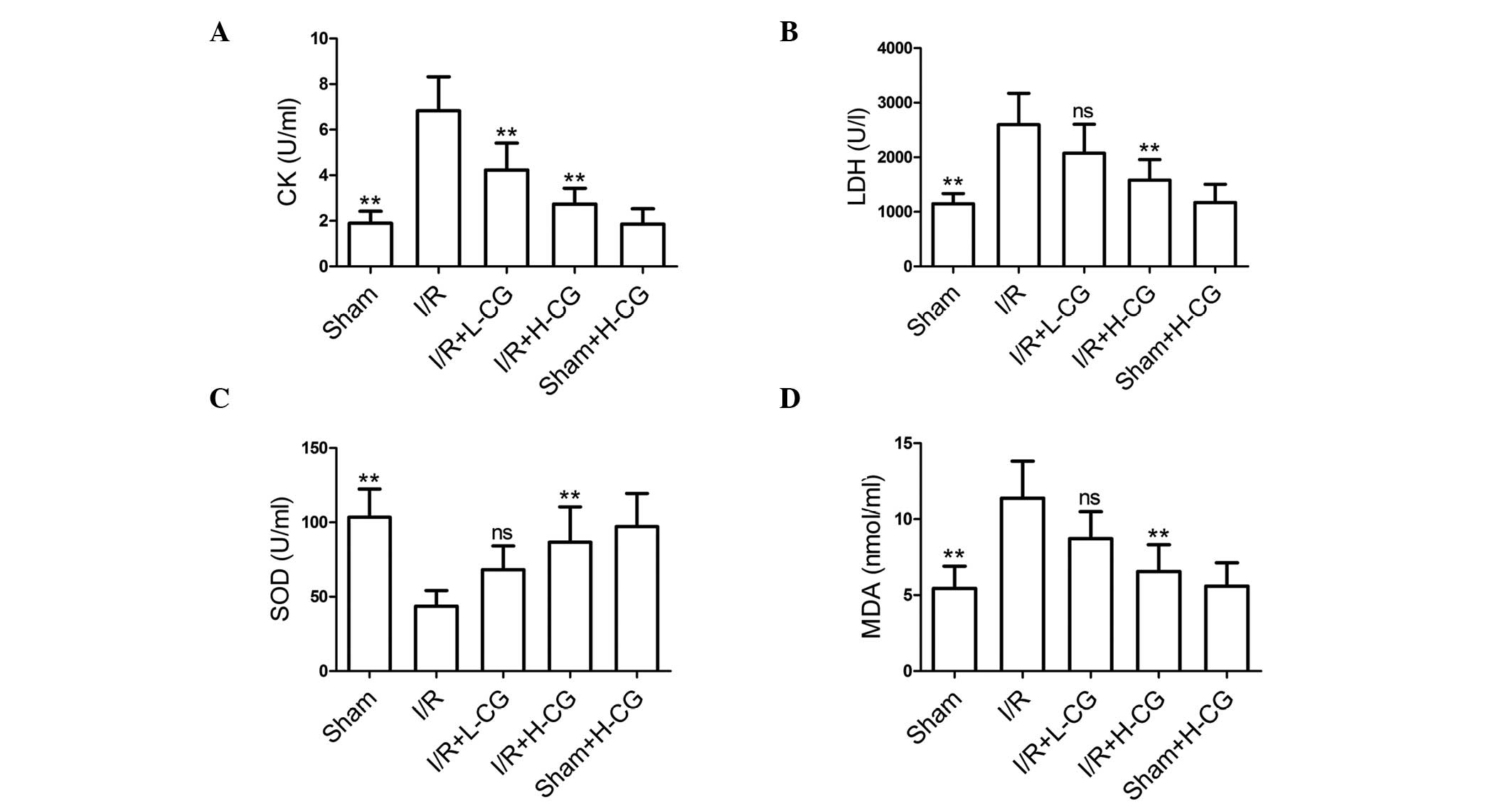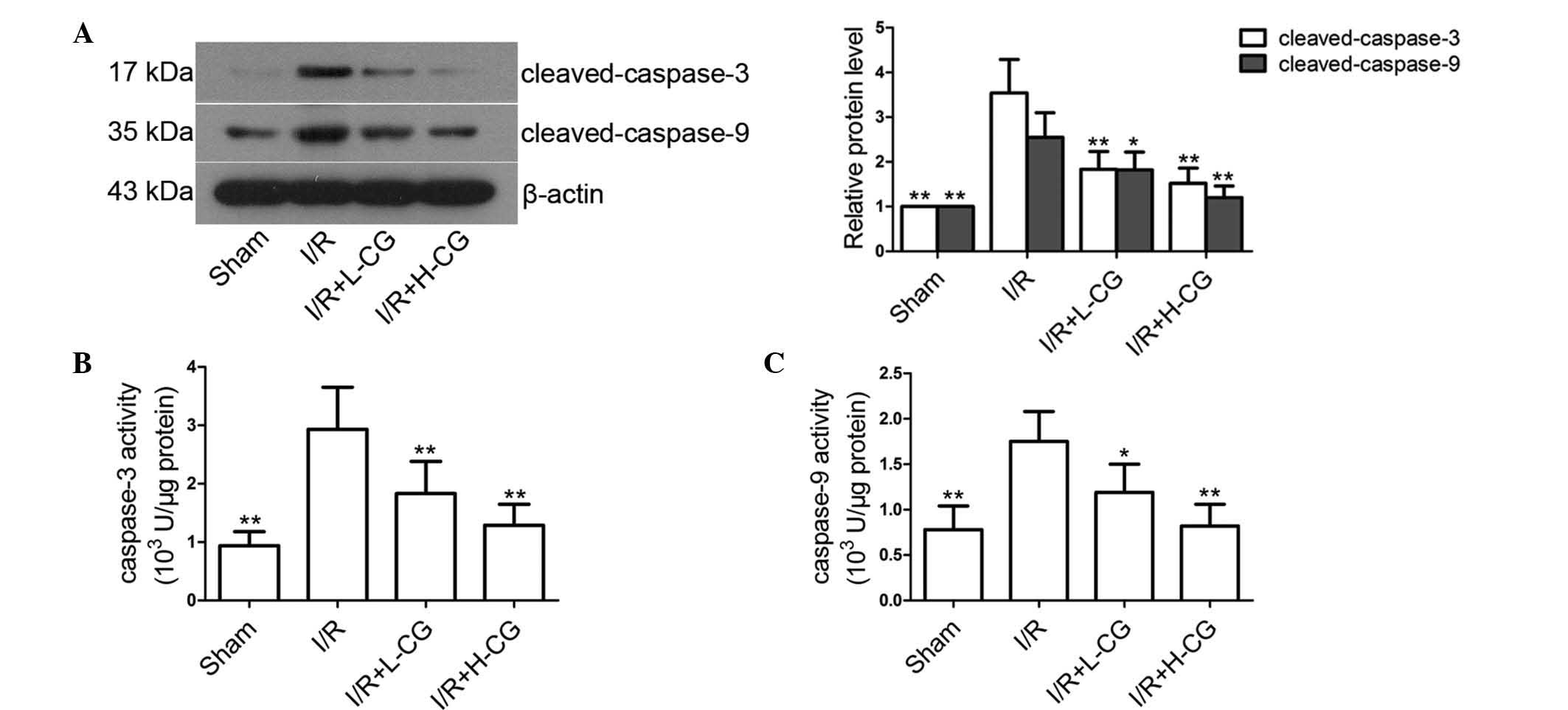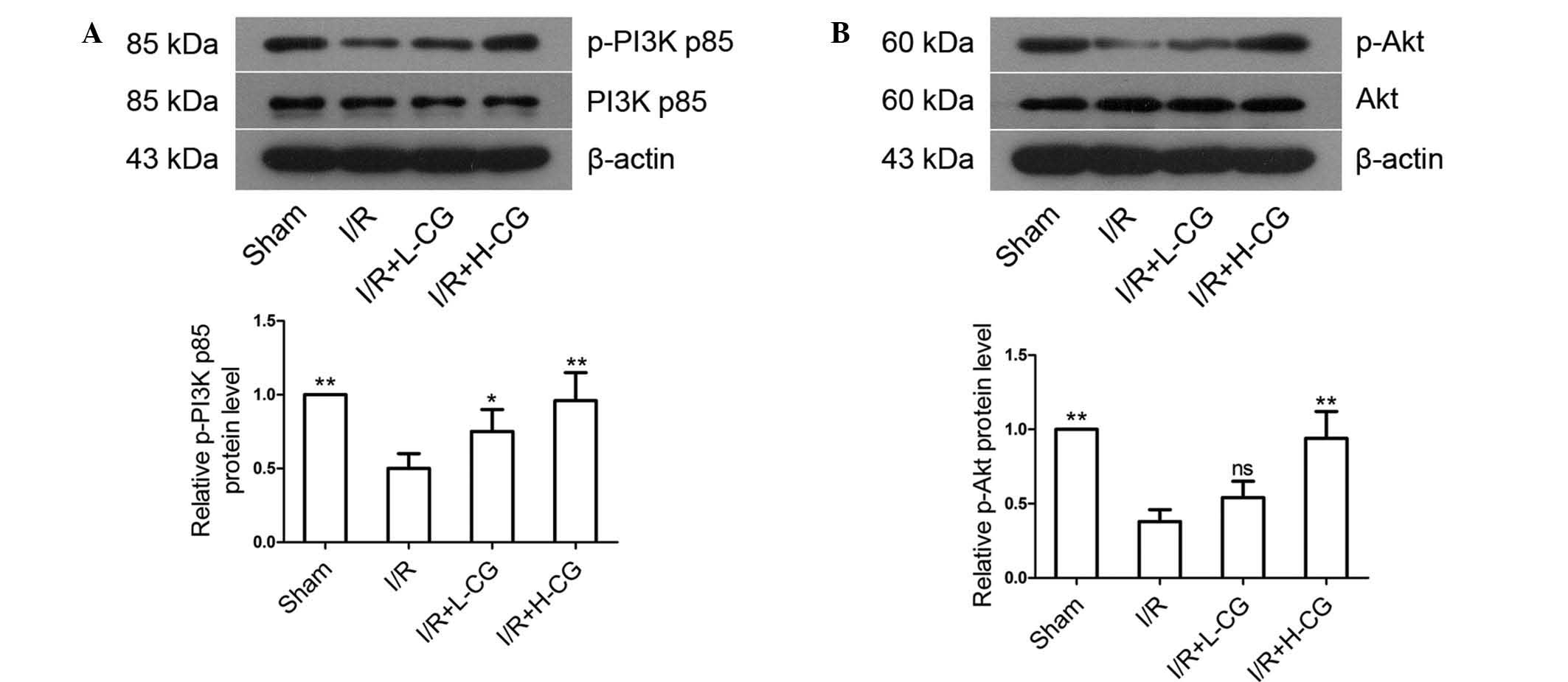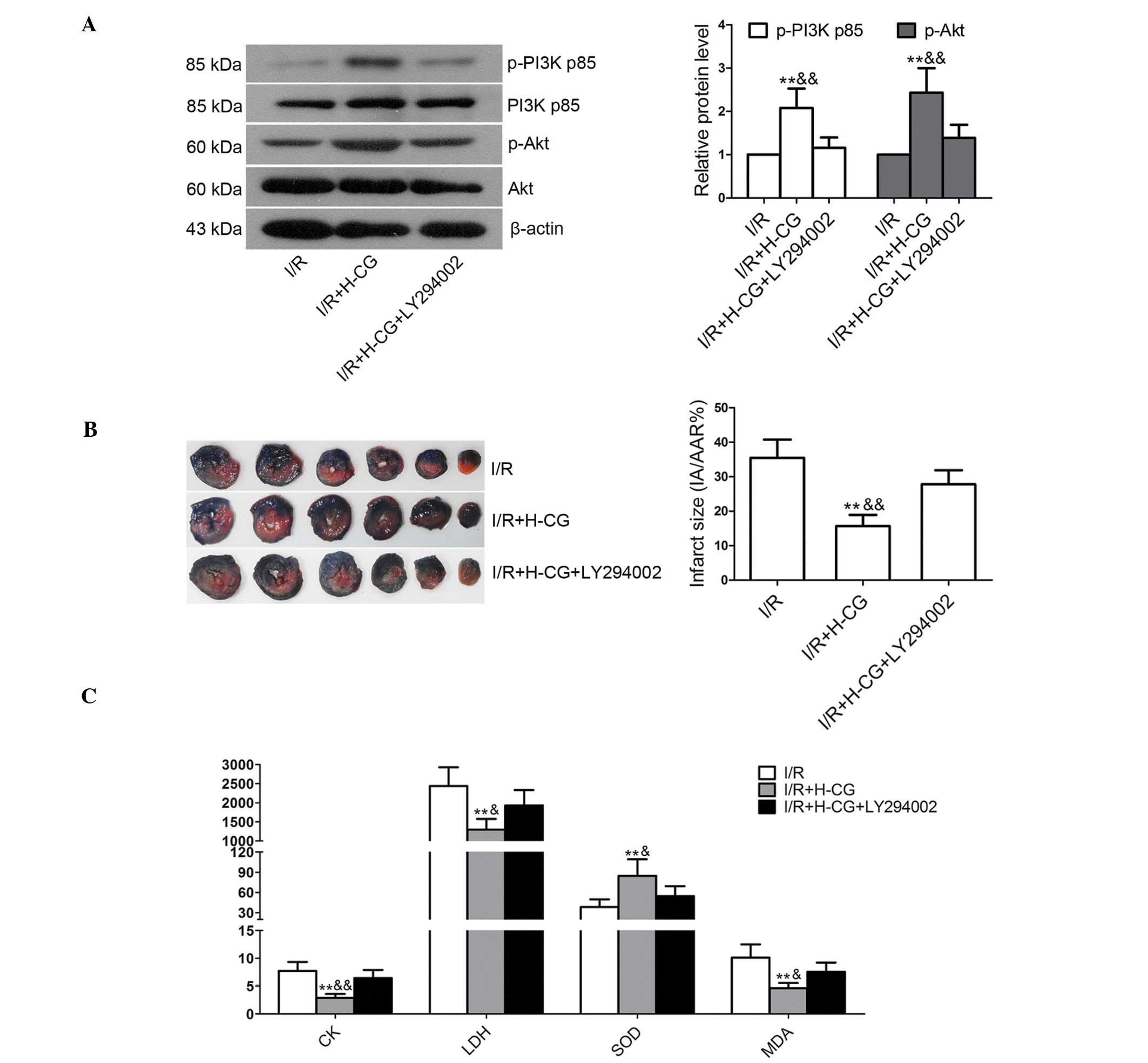|
1
|
Murray CJ and Lopez AD: Mortality by cause
for eight regions of the world: Global Burden of Disease Study.
Lancet. 349:1269–1276. 1997. View Article : Google Scholar : PubMed/NCBI
|
|
2
|
White HD and Chew DP: Acute myocardial
infarction. Lancet. 372:570–584. 2008. View Article : Google Scholar : PubMed/NCBI
|
|
3
|
Betgem RP, de Waard GA, Nijveldt R, Beek
AM, Escaned J and van Royen N: Intramyocardial haemorrhage after
acute myocardial infarction. Nat Rev Cardiol. 12:156–167. 2015.
View Article : Google Scholar
|
|
4
|
Lincoff AM and Topol EJ: Illusion of
reperfusion. Does anyone achieve optimal reperfusion during acute
myocardial infarction? Circulation. 88:1361–1374. 1993. View Article : Google Scholar : PubMed/NCBI
|
|
5
|
Hartwell D, Colquitt J, Loveman E, Clegg
AJ, Brodin H, Waugh N, Royle P, Davidson P, Vale L and MacKenzie L:
Clinical effectiveness and cost-effectiveness of immediate
angioplasty for acute myocardial infarction: Systematic review and
economic evaluation. Health Technol Assess. 9:1–99. 2005.
View Article : Google Scholar : PubMed/NCBI
|
|
6
|
Luo J, Xu H and Chen KJ: Potential
benefits of Chinese Herbal Medicine for elderly patients with
cardiovascular diseases. J Geriatr Cardiol. 10:305–309. 2013.
|
|
7
|
Clifford DM, Fisher SA, Brunskill SJ,
Doree C, Mathur A, Watt S and Martin-Rendon E: Stem cell treatment
for acute myocardial infarction. Cochrane Database Syst Rev.
2:CD0065362012.PubMed/NCBI
|
|
8
|
Abela CB and Homer-Vanniasinkham S:
Clinical implications of ischaemia-reperfusion injury.
Pathophysiology. 9:229–240. 2003. View Article : Google Scholar : PubMed/NCBI
|
|
9
|
Yu KZ, Liu J, Guo BL, Zhao ZZ, Hong H,
Chen HB and Cai SQ: Microscopic research on a multi-source
traditional Chinese medicine, Astragali Radix. J Nat Med.
68:340–350. 2014. View Article : Google Scholar
|
|
10
|
Ismail ZM, Amin NM, Yacoub MF and Mohamed
AM: Myelo-enhancement by astragalus membranaceus in male albino
rats with chemotherapy myelo-suppression. Histological and
immunohistochemical study. Int J Stem Cells. 7:12–22. 2014.
View Article : Google Scholar : PubMed/NCBI
|
|
11
|
Liu XB, Ma L, Zhang AH, Zhang YH, Jiang J,
Ma W, Zhang LM, Ren WC and Kong XJ: High-throughput analysis and
characterization of Astragalus membranaceus transcriptome using 454
GS FLX. PLoS One. 9:e958312014. View Article : Google Scholar : PubMed/NCBI
|
|
12
|
Jin Y, Chen Q, Li X, Fan X and Li Z:
Astragali Radix protects myocardium from ischemia injury by
modulating energy metabolism. Int J Cardiol. 176:1312–1315. 2014.
View Article : Google Scholar : PubMed/NCBI
|
|
13
|
Xu X, Li F, Zhang X, Li P, Zhang X, Wu Z
and Li D: In vitro synergistic antioxidant activity and
identification of antioxidant components from Astragalus
membranaceus and Paeonia lactiflora. PLoS One. 9:e967802014.
View Article : Google Scholar
|
|
14
|
Luo Y, Qin Z, Hong Z, Zhang X, Ding D, Fu
JH, Zhang WD and Chen J: Astragaloside IV protects against ischemic
brain injury in a murine model of transient focal ischemia.
Neurosci Lett. 363:218–223. 2004. View Article : Google Scholar : PubMed/NCBI
|
|
15
|
Ko JK and Chik CW: The protective action
of radix Astragalus membranaceus against hapten-induced colitis
through modulation of cytokines. Cytokine. 47:85–90. 2009.
View Article : Google Scholar : PubMed/NCBI
|
|
16
|
Ma XQ, Shi Q, Duan JA, Dong TT and Tsim
KW: Chemical analysis of Radix Astragali (Huangqi) in China: A
comparison with its adulterants and seasonal variations. J Agric
Food Chem. 50:4861–4866. 2002. View Article : Google Scholar : PubMed/NCBI
|
|
17
|
Yu H, Zhang WL, Ding X, Zheng KY, Ho CM,
Tsim KW and Lee YK: Optimizing combinations of flavonoids deriving
from astragali radix in activating the regulatory element of
erythropoietin by a feedback system control scheme. Evid Based
Complement Alternat Med. 2013:5414362013. View Article : Google Scholar : PubMed/NCBI
|
|
18
|
Zheng KY, Choi RC, Cheung AW, Guo AJ, Bi
CW, Zhu KY, Fu Q, Du Y, Zhang WL, Zhan JY, et al: Flavonoids from
Radix Astragali induce the expression of erythropoietin in cultured
cells: A signaling mediated via the accumulation of
hypoxia-inducible factor-1α. J Agric Food Chem. 59:1697–1704. 2011.
View Article : Google Scholar : PubMed/NCBI
|
|
19
|
Lin LZ, He XG, Lindenmaier M, Nolan G,
Yang J, Cleary M, Qiu SX and Cordell GA: Liquid
chromatography-electrospray ionization mass spectrometry study of
the flavonoids of the roots of Astragalus mongholicus and A.
membranaceus. J Chromatogr A. 876:87–95. 2000. View Article : Google Scholar : PubMed/NCBI
|
|
20
|
Li W, Sun YN, Yan XT, Yang SY, Kim S, Lee
YM, Koh YS and Kim YH: Flavonoids from Astragalus membranaceus and
their inhibitory effects on LPS-stimulated pro-inflammatory
cytokine production in bone marrow-derived dendritic cells. Arch
Pharm Res. 37:186–192. 2014. View Article : Google Scholar
|
|
21
|
Pan H, Wang Y, Zhang Y, Zhou T, Fang C,
Nan P, Wang X, Li X, Wei Y and Chen J: Phenylalanine ammonia lyase
functions as a switch directly controlling the accumulation of
calycosin and calycosin-7-O-beta-D-glucoside in Astragalus
membranaceus var. mongholicus plants. J Exp Bot. 59:3027–3037.
2008. View Article : Google Scholar : PubMed/NCBI
|
|
22
|
Fu S, Gu Y, Jiang JQ, Chen X, Xu M, Chen X
and Shen J: Calycosin-7-O-β-D-glucoside regulates nitric
oxide/caveolin-1/matrix metalloproteinases pathway and protects
blood-brain barrier integrity in experimental cerebral
ischemia-reperfusion injury. J Ethnopharmacol. 155:692–701. 2014.
View Article : Google Scholar : PubMed/NCBI
|
|
23
|
Ozaki K, Inoue K, Sato H, Iida A, Ohnishi
Y, Sekine A, Sato H, Odashiro K, Nobuyoshi M, Hori M, et al:
Functional variation in LGALS2 confers risk of myocardial
infarction and regulates lymphotoxin-alpha secretion in vitro.
Nature. 429:72–75. 2004. View Article : Google Scholar : PubMed/NCBI
|
|
24
|
Timmers L, Sluijter JP, van Keulen JK,
Hoefer IE, Nederhoff MG, Goumans MJ, Doevendans PA, van Echteld CJ,
Joles JA, Quax PH, et al: Toll-like receptor 4 mediates maladaptive
left ventricular remodeling and impairs cardiac function after
myocardial infarction. Circ Res. 102:257–264. 2008. View Article : Google Scholar
|
|
25
|
Zou Y, Takano H, Mizukami M, Akazawa H,
Qin Y, Toko H, Sakamoto M, Minamino T, Nagai T and Komuro I:
Leukemia inhibitory factor enhances survival of cardiomyocytes and
induces regeneration of myocardium after myocardial infarction.
Circulation. 108:748–753. 2003. View Article : Google Scholar : PubMed/NCBI
|
|
26
|
Moens AL, Claeys MJ, Timmermans JP and
Vrints CJ: Myocardial ischemia/reperfusion-injury, a clinical view
on a complex pathophysiological process. Int J Cardiol.
100:179–190. 2005. View Article : Google Scholar : PubMed/NCBI
|
|
27
|
Prasad A, Stone GW, Holmes DR and Gersh B:
Reperfusion injury, microvascular dysfunction and cardioprotection:
The 'dark side' of reperfusion. Circulation. 120:2105–2112. 2009.
View Article : Google Scholar : PubMed/NCBI
|
|
28
|
Ahmed LA, Salem HA, Attia AS and El-Sayed
ME: Enhancement of amlodipine cardioprotection by quercetin in
ischaemia/reperfusion injury in rats. J Pharm Pharmacol.
61:1233–1241. 2009. View Article : Google Scholar : PubMed/NCBI
|
|
29
|
Buja LM and Weerasinghe P: Unresolved
issues in myocardial reperfusion injury. Cardiovasc Pathol.
19:29–35. 2010. View Article : Google Scholar
|
|
30
|
Ali N, Rizwi F, Iqbal A and Rashid A:
Induced remote ischemic pre-conditioning on ischemia-reperfusion
injury in patients undergoing coronary artery bypass. J Coll
Physicians Surg Pak. 20:427–431. 2010.PubMed/NCBI
|
|
31
|
Toldo S, Seropian IM, Mezzaroma E, Van
Tassell BW, Salloum FN, Lewis EC, Voelkel N, Dinarello CA and
Abbate A: Alpha-1 antitrypsin inhibits caspase-1 and protects from
acute myocardial ischemia-reperfusion injury. J Mol Cell Cardiol.
51:244–251. 2011. View Article : Google Scholar : PubMed/NCBI
|
|
32
|
Fan Q, Chen M, Zuo L, Shang X, Huang MZ,
Ciccarelli M, Raake P, Brinks H, Chuprun KJ, Dorn GW II, et al:
Myocardial ablation of G protein-coupled receptor kinase 2 (GRK2)
decreases ischemia/reperfusion injury through an anti-intrinsic
apoptotic pathway. PLoS One. 8:e662342013. View Article : Google Scholar : PubMed/NCBI
|
|
33
|
Zhou YC, Liu B, Li YJ, Jing LL, Wen G,
Tang J, Xu X, Lv ZP and Sun XG: Effects of buyang huanwu decoction
on ventricular remodeling and differential protein profile in a rat
model of myocardial infarction. Evid Based Complement Alternat Med.
2012:3852472012. View Article : Google Scholar : PubMed/NCBI
|
|
34
|
Song CL, Liu B, Diao HY, Shi YF, Li YX,
Zhang JC, Lu Y, Wang G, Liu J, Yu YP, et al: The protective effect
of microRNA-320 on left ventricular remodeling after myocardial
ischemia-reperfusion injury in the rat model. Int J Mol Sci.
15:17442–17456. 2014. View Article : Google Scholar : PubMed/NCBI
|
|
35
|
Zhao G, Wang S, Wang Z, Sun A, Yang X, Qiu
Z, Wu C, Zhang W, Li H, Zhang Y, et al: CXCR6 deficiency
ameliorated myocardial ischemia/reperfusion injury by inhibiting
infiltration of monocytes and IFN-γ-dependent autophagy. Int J
Cardiol. 168:853–862. 2013. View Article : Google Scholar
|
|
36
|
Wang Y, Li X, Wang X, Lau W, Wang Y, Xing
Y, Zhang X, Ma X and Gao F: Ginsenoside Rd attenuates myocardial
ischemia/reperfusion injury via Akt/GSK-3β signaling and inhibition
of the mitochondria-dependent apoptotic pathway. PLoS One.
8:e709562013. View Article : Google Scholar
|
|
37
|
Han J, Wang D, Yu B, Wang Y, Ren H, Zhang
B, Wang Y and Zheng Q: Cardioprotection against
ischemia/reperfusion by licochalcone B in isolated rat hearts. Oxid
Med Cell Longev. 2014:1348622014. View Article : Google Scholar : PubMed/NCBI
|
|
38
|
Kemp M, Donovan J, Higham H and Hooper J:
Biochemical markers of myocardial injury. Br J Anaesth. 93:63–73.
2004. View Article : Google Scholar : PubMed/NCBI
|
|
39
|
Singh G, Rohilla A, Singh M and Balakumar
P: Possible role of JAK-2 in attenuated cardioprotective effect of
ischemic preconditioning in hyperhomocysteinemic rat hearts.
Yakugaku Zasshi. 129:523–535. 2009. View Article : Google Scholar : PubMed/NCBI
|
|
40
|
Petrosillo G, Ruggiero FM, Di Venosa N and
Paradies G: Decreased complex III activity in mitochondria isolated
from rat heart subjected to ischemia and reperfusion: Role of
reactive oxygen species and cardiolipin. FASEB J. 17:714–716.
2003.PubMed/NCBI
|
|
41
|
Shimouchi A, Yokota H, Ono S, et al:
Neuroprotective effect of water-dispersible hesperetin in retinal
ischemia reperfusion injury. Jpn J Ophthalmol. Sept 25–2015.Epub
ahead of print. View Article : Google Scholar : PubMed/NCBI
|
|
42
|
Wang AL, Niu Q, Shi N, et al: Glutamine
ameliorates intestinal ischemia-reperfusion Injury in rats by
activating the Nrf2/Are signaling pathway. Int J Clin Exp Pathol.
8:7896–7904. 2015.PubMed/NCBI
|
|
43
|
Kalaycioglu S, Sinci V, Imren Y and Oz E:
Metoprolol prevents ischemia-reperfusion injury by reducing lipid
peroxidation. Jpn Circ J. 63:718–721. 1999. View Article : Google Scholar : PubMed/NCBI
|
|
44
|
Dhalla NS, Elmoselhi AB, Hata T and Makino
N: Status of myocardial antioxidants in ischemia-reperfusion
injury. Cardiovasc Res. 47:446–456. 2000. View Article : Google Scholar : PubMed/NCBI
|
|
45
|
Zhang S, Li H and Yang SJ: Tribulosin
protects rat hearts from ischemia/reperfusion injury. Acta
Pharmacol Sin. 31:671–678. 2010. View Article : Google Scholar : PubMed/NCBI
|
|
46
|
Nakagawa T, Zhu H, Morishima N, Li E, Xu
J, Yankner BA and Yuan J: Caspase-12 mediates
endoplasmic-reticulum-specific apoptosis and cytotoxicity by
amyloid-beta. Nature. 403:98–103. 2000. View Article : Google Scholar : PubMed/NCBI
|
|
47
|
Riedl SJ and Shi Y: Molecular mechanisms
of caspase regulation during apoptosis. Nat Rev Mol Cell Biol.
5:897–907. 2004. View Article : Google Scholar : PubMed/NCBI
|
|
48
|
Waterhouse NJ, Goldstein JC, von Ahsen O,
Schuler M, Newmeyer DD and Green DR: Cytochrome c maintains
mitochondrial transmembrane potential and ATP generation after
outer mitochondrial membrane permeabilization during the apoptotic
process. J Cell Biol. 153:319–328. 2001. View Article : Google Scholar : PubMed/NCBI
|
|
49
|
Denault JB, Eckelman BP, Shin H, Pop C and
Salvesen GS: Caspase 3 attenuates XIAP (X-linked inhibitor of
apoptosis protein)-mediated inhibition of caspase 9. Biochem J.
405:11–19. 2007. View Article : Google Scholar : PubMed/NCBI
|
|
50
|
Hamacher-Brady A, Brady NR, Logue SE,
Sayen MR, Jinno M, Kirshenbaum LA, Gottlieb RA and Gustafsson AB:
Response to myocardial ischemia/reperfusion injury involves Bnip3
and autophagy. Cell Death Differ. 14:146–157. 2007. View Article : Google Scholar
|
|
51
|
Zhang W, Xing B, Yang L, Shi J and Zhou X:
Icaritin attenuates myocardial ischemia and reperfusion injury via
anti-inflammatory and anti-oxidative stress effects in rats. Am J
Chin Med. 43:1083–1097. 2015. View Article : Google Scholar : PubMed/NCBI
|
|
52
|
Shin YK, Liu Q, Tikoo SK, Babiuk LA and
Zhou Y: Influenza A virus NS1 protein activates the
phosphatidylinositol 3-kinase (PI3K)/Akt pathway by direct
interaction with the p85 subunit of PI3K. J Gen Virol. 88(Pt 1):
13–18. 2007. View Article : Google Scholar
|
|
53
|
Ray PD, Huang BW and Tsuji Y: Reactive
oxygen species (ROS) homeostasis and redox regulation in cellular
signaling. Cell Signal. 24:981–990. 2012. View Article : Google Scholar : PubMed/NCBI
|
|
54
|
Massion PP, Taflan PM, Shyr Y, Rahman SM,
Yildiz P, Shakthour B, Edgerton ME, Ninan M, Andersen JJ and
Gonzalez AL: Early involvement of the phosphatidylinositol
3-kinase/Akt pathway in lung cancer progression. Am J Respir Crit
Care Med. 170:1088–1094. 2004. View Article : Google Scholar : PubMed/NCBI
|
|
55
|
Zhang Y, Wei L, Sun D, Cao F, Gao H, Zhao
L, Du J, Li Y and Wang H: Tanshinone IIA pretreatment protects
myocardium against ischaemia/reperfusion injury through the
phosphatidylinositol 3-kinase/Akt-dependent pathway in diabetic
rats. Diabetes Obes Metab. 12:316–322. 2010. View Article : Google Scholar : PubMed/NCBI
|
|
56
|
Fujio Y, Nguyen T, Wencker D, Kitsis RN
and Walsh K: Akt promotes survival of cardiomyocytes in vitro and
protects against ischemia-reperfusion injury in mouse heart.
Circulation. 101:660–667. 2000. View Article : Google Scholar : PubMed/NCBI
|















